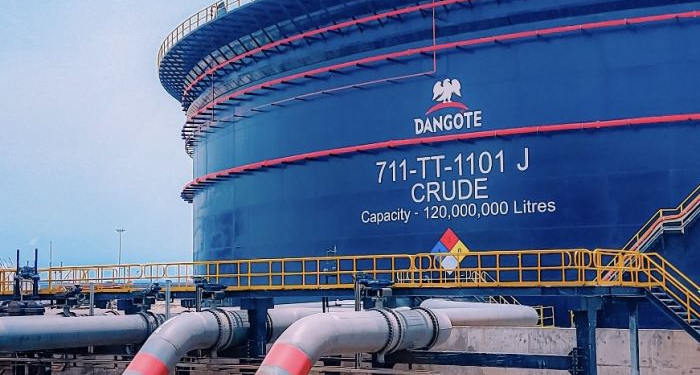The Nigerian government has officially launched the Naira-for-crude oil sale agreement with the Dangote Refinery, marking a significant shift in the country’s petroleum trading landscape. This move, which began on October 1, 2024, is expected to reshape the pricing structure of fuel in Nigeria, potentially leading to lower costs at the pump. The announcement was made by Nigeria’s Minister of Finance and Coordinating Minister of the Economy, Wale Edun, in a statement shared on the Ministry’s official social media platform.
The launch of the Naira-for-crude oil arrangement follows a directive from the Federal Executive Council (FEC) aimed at stabilizing the price of petrol in the country by allowing crude oil sales in local currency. This initiative comes at a critical time, as fuel prices in Nigeria have surged to between N950 and N1,100 per liter. The hope is that by linking crude oil transactions to the Naira, domestic fuel prices can be moderated, providing relief to consumers who have been hit hard by the high cost of fuel since the removal of subsidies earlier in 2023.
On October 3, 2024, a post-commencement review of the agreement was held, chaired by Minister Wale Edun, alongside key stakeholders from the energy and finance sectors. The meeting reaffirmed the government’s commitment to the initiative and provided an opportunity to assess the initial implementation of the Naira-for-crude sales strategy. The review included representatives from the Nigerian National Petroleum Company (NNPC), Dangote Group, the Ministry of Petroleum, and other relevant government bodies.
In his statement, Edun highlighted the strategic importance of the initiative and its alignment with the government’s broader economic goals. “In line with the Federal Executive Council directive, the sale of crude oil and refined petroleum products in Naira has officially commenced as of October 1st, 2024. This strategic initiative is designed to ensure that Nigerians benefit directly from the refining of crude oil within our borders,” he said.
The stakeholders’ meeting included high-level officials such as the Minister of State for Petroleum (Oil), the Special Advisers to the President on Revenue and Energy, the Chief Executive Officer of the Nigerian Midstream and Downstream Petroleum Regulatory Authority (NMDPRA), and key representatives from Dangote Group, including the Vice President and other senior executives. The NNPC delegation was led by its Group Chief Executive Officer (GCEO), Chief Financial Officer (CFO), and Executive Vice President of the Downstream sector.
The Naira-for-crude agreement is part of the government’s ongoing efforts to address the challenges posed by fluctuating fuel prices and the heavy reliance on imported petroleum products. With the Dangote Refinery now operational, the agreement is expected to significantly reduce Nigeria’s dependence on foreign refined petroleum imports, which have contributed to volatile fuel prices in the past. By linking crude oil sales to the Naira, the government hopes to exert greater control over fuel pricing while reducing the pressure on foreign exchange reserves.
This agreement comes amid ongoing debates about the feasibility and potential impact of the deal. Some petroleum marketers and analysts have expressed cautious optimism, suggesting that the Naira-for-crude initiative could lead to a reduction in fuel pump prices in the near future. If the deal is successful, it could set a precedent for future transactions in Nigeria’s oil and gas sector, promoting greater use of local currency in an industry traditionally dominated by the US dollar.
President Bola Ahmed Tinubu, who directed the NNPC to sell crude oil to Dangote Refinery in Naira back in July 2024, has championed the deal as part of his broader economic reform agenda. His administration has prioritized initiatives that aim to stabilize the energy sector, reduce the country’s reliance on fuel imports, and ensure that domestic consumers benefit from Nigeria’s vast crude oil resources.
As the Naira-for-crude sale agreement progresses, all eyes are on the potential effects it will have on fuel prices and overall economic stability. While uncertainties remain, the government’s bold move signals a commitment to harnessing the benefits of local refining capacity and stabilizing the economy through innovative financial strategies. Whether this deal will achieve the desired outcomes of lower fuel prices and enhanced energy security remains to be seen, but it undoubtedly marks a new chapter in Nigeria’s management of its oil resources.













Leave a comment